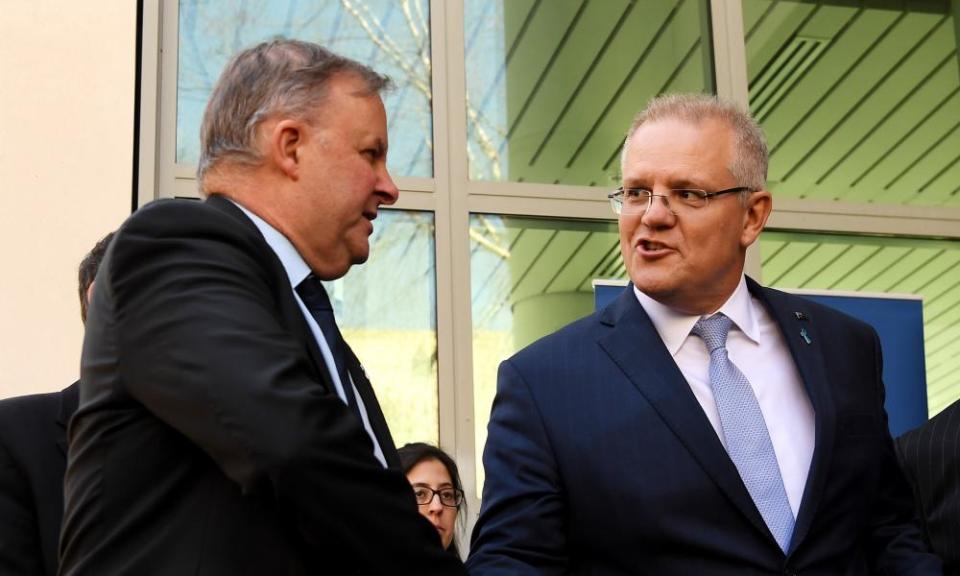Essential poll: majority of Australians support medevac or better asylum care

A majority of Australians either approve of the medevac procedures, or think more needs to be done to protect the health and welfare of asylum seekers offshore, according to the latest Guardian Essential poll.
While the fortnightly survey of 1,093 respondents finds majority support (52%) for offshore detention, with 25% signalling strong support for Australia’s harsh deterrence framework – 41% of the survey thinks the medevac procedures strike a balance between strong borders and humane treatment for people in offshore detention, and 23% argue the legislation does not go far enough to provide humane treatment for people in offshore detention.
The Morrison government wants to repeal the medical evacuation procedures imposed on the Coalition by the crossbench, Labor and the Greens during the period of minority government before the May election. The procedures give clinicians more of a say in whether sick people are transferred from Nauru and Manus Island to Australia for medical treatment.
Related: Medevac repeal bill: Coalition accused of trying to reinstate 'sociopathic' regime
Despite strenuous objections from a range of stakeholders, the medevac repeal legislation has already passed the House of Representatives and is now subject to an inquiry by the Senate’s legal and constitutional legislative committee with a report date of 18 October.
The government recently flagged bringing the repeal vote forward to the September parliamentary sitting rather than waiting until the conclusion of the Senate inquiry, but was warned off that course of action by the critical Senate kingmaker, Jacqui Lambie, who declared the government needed to use its “bloody manners” and wait until later in the year rather than attempting to crash through.
The latest Guardian Essential survey suggests voter support for the medevac regime is currently about the same as it was in February this year despite the government contending regularly in partisan messaging that the procedures are harmful to border security.
Public perceptions that the legislation will weaken Australia’s borders and result in boats arriving have decreased since the start of the year from 30% to 21%. At the same time, concerns from voters that the medevac regime does not go far enough to provide humane treatment for people in offshore detention has increased from 15% in February to 23% this fortnight.
Coalition voters, men and voters in the cities are more inclined to believe that medevac strikes a balance between strong borders and humane treatment for people in offshore detention, while Labor and Greens voters, younger people and people with university education worry the protections don’t go far enough.
Coalition voters and people intending to vote for someone other than the major parties are the strongest supporters of offshore detention, while Labor and Greens voters are more likely to oppose the policy.
The Senate inquiry has heard appeals from doctors, refugee advocates and lawyers to maintain the medevac regime. The inquiry has heard from doctors responsible for health assessments that of 581 people in detention they have audited 97% have significant physical health issues and 91% have serious mental health issues.
The latest Guardian Essential poll indicates Scott Morrison continues to enjoy support from voters post-election, with just under half the sample (49%) giving him the thumbs up. The approval has remained consistent post-election and Morrison’s approval is five points higher that it was prior to the campaign.
Voters are also still coming to terms with Labor’s new leader, Anthony Albanese. Albanese gets the thumbs up from 36% of the sample, but 33% of respondents say they don’t yet know whether they approve or disapprove. The disapproval rating for both leaders is similar – for Morrison its 36% and Albanese 31%.
Morrison also remains ahead of his political opponent as better prime minister in the survey, with 46% backing the Liberal leader and 25% Albanese – which is a three-point drop for the Labor leader since last month.
Related: 'Going to the streets again': what you need to know about Friday's climate strike
Voters were also asked questions this fortnight about the climate strike, scheduled for this Friday, and more than half the sample, 55% supported using strike action to push for governments to act on climate change and move towards renewable energy.
Approval divides along partisan lines. Labor (74%) and Green voters (91%) approve of the action, as do voters under 34 (74%), university-educated voters (67%) and employed people (69%), while 41% of Coalition voters don’t support the action.
But only 5% of the sample will be striking on Friday with another 11% supporting the action in some other way.
There has been controversy post-election about the reliability of opinion polling because none of the major surveys – Newspoll, Ipsos, Galaxy or Essential – correctly predicted a Coalition victory on 18 May, projecting Labor in front on a two-party-preferred vote of 51-49 and 52-48.
The lack of precision in the polling has prompted public reflection at Essential, as has been flagged by its executive director, Peter Lewis.
Guardian Australia is not now publishing measurements of primary votes or a two-party-preferred calculation, but is continuing to publish survey results of responses to questions about the leaders and a range of policy issues.
The poll’s margin of error is plus or minus 3%.

 Yahoo News
Yahoo News 